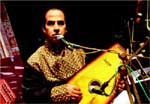In conversation with Tapan Kanti Baidya
 “Dada” Tapan Kanti Baidya is a renowned classical music vocalist and an adept teacher — well recognised both at home and abroad. He is the only artiste from Bangladesh who performed at United Nations’ ECOSOC Hall, New York in 1998. The then UN Secretary General Kofi Anan, together with a number of diplomats and Nobel laureate Amartya Sen, enjoyed that performance. Baidya is also the lone invited artiste from Bangladesh to perform at India Habitat Centre, New Delhi, India in 2002. He is the initiator of dhrupad-dhamar in Bangladesh.
“Dada” Tapan Kanti Baidya is a renowned classical music vocalist and an adept teacher — well recognised both at home and abroad. He is the only artiste from Bangladesh who performed at United Nations’ ECOSOC Hall, New York in 1998. The then UN Secretary General Kofi Anan, together with a number of diplomats and Nobel laureate Amartya Sen, enjoyed that performance. Baidya is also the lone invited artiste from Bangladesh to perform at India Habitat Centre, New Delhi, India in 2002. He is the initiator of dhrupad-dhamar in Bangladesh.
“Dhrupad-dhamar is at the peak of north Indian classical music. Khayal stands in the middle, while thumri and dadra are considered semi classical. The mood of dhrupad can best be defined by meditation. Dhrupad is to sing for Divinity; to sing for the ultimate, while the ultimate destination of khayal is to reach the senses,” explains the artiste.
“Pakhawaj, and not tabla, accompanies a dhrupad-dhamar performance. Unusual taal like chautal (12 beats), dhamar (14 beats) and surphak (10 beats) are usually played in a dhrupad performance. The first part of dhrupad is called dhrupad alaap jor that leads to a deep-rooted and very abstract form of classical music, while second and final part of it is called dhrupad bandish that focuses on the variation of speed of taal or laykari with lyrics,” adds Baidya.
Born in 1954 in Chittagong, Dada Tapan Kanti Baidya received music lessons from his father, Dr. Motilal Baidya. His other gurus in Bangladesh were Pandit Priyoda Ranjan Sengupta, Pandit Jagodananda Barua and Ustad Abdul Halim Chowdhury.
Baidya studied Indian classical music under the tutelage of renowned Indian gurus Pandit VB Wajel War and Pandit Nimai Chand Boral of Dagar gharana (dhrupad-dhamar); Pandit Alok Chattopadhyay of Kirana gharana (khayal); Pandit Prashun Bandyopadhyay of Patiala gharana (khayal and thumri), Ustad Yunus Hossain Khan of Agra and Atroli gharana (khayal and thumri), Pandit Ajoy Chakrobarty of Patiala gharana (special training) and Pandti Mohon Singh Khangura of Panjabi gharana (khayal and thumri).
Baidya also learned Rabindra Sangeet from legendary singers like Konika Bandyopadhyay, Nilima Sen and Gora Sarbadhikari. The artiste bagged Ashraf Smriti Swarno Padok, participating in the first National Nazrul Sangeet Competition, in Bangladesh in 1975.
Students United for Research in Musical Activities (SURMA) arranged a record-breaking solo Indian classical music (vocal) performance at TSC Auditorium, Dhaka University on January 26 this year. The featured artiste was none other than Dada Tapan Kanti Baidya who performed non-stop for five hours, a feat that vies for a place in the Guinness Book of World Records.
As part of the audience, this writer accompanied “Dada” on his musical voyage that night. His performances featured dhrupad, dhamar, khayal, tarana and ragas set on various themes like articulating the mood during the time between afternoon and dusk; ragas suitable for the evening, night, winter and advent of spring.
The soiree also witnessed the launch of a VCD series, titled “Sangeet Guru Ananda” that offers tips on the quickest way to learn Indian classical music in only two months. Raga Yaman and Bhupali (first and second part) were presented in two separate discs. At least 50 ragas will be included in the series in the days to come. “Ananda” is the pseudonym of the artiste. Sadarang World Wide Music Centre is producing the VCD series.
“Despite having enthusiasts, eager learners and arrangements, Bangladesh cannot produce classical music performers on a large scale, because the source of it is very week. We start learning only with tanpura, sidelining harmonium as it lessens creativity. We should receive lessons from able gurus and perform regularly. Then the style of gharana will be created,” the artiste asserts.
The artiste has established a distinctive style of rendition which he feels free to term “Dada gharana”. He has taken “Dada” as his title, rather than the traditional Pandit or Ustad, as he believes that these have religious connotations.
-With The Daily Star input




















